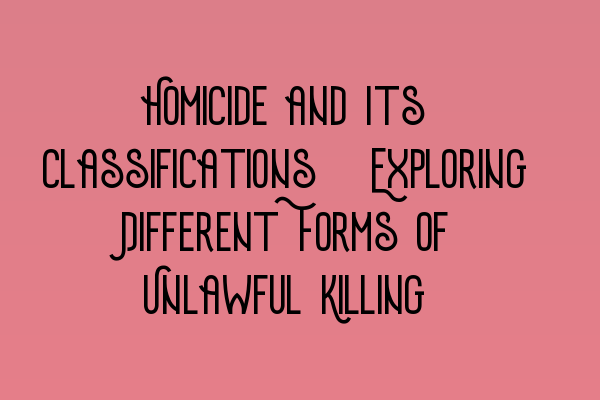Homicide and Its Classifications: Exploring Different Forms of Unlawful Killing
When it comes to criminal law, one of the most severe offenses an individual can commit is homicide. Homicide refers to the act of unlawfully killing another person, and it is considered a grave crime that carries severe legal consequences. In the context of criminal law in the UK, homicide has various classifications, each associated with different elements and circumstances. Understanding these classifications is crucial for legal professionals working in the field of criminal law.
Murder
The first and most serious classification of homicide is murder. Murder occurs when an individual intentionally and unlawfully causes the death of another person. It involves the element of malice aforethought, which means that the offender had the intention to cause serious harm or kill the victim.
In murder cases, the prosecution must prove beyond a reasonable doubt that the defendant had both the intention to kill and the requisite mental state to commit the crime. If convicted of murder, the offender faces life imprisonment.
Manslaughter
Manslaughter is another form of unlawful killing, but it is distinct from murder in terms of intent. Unlike murder, manslaughter does not require the element of malice aforethought. Instead, it involves the act of unlawfully causing the death of another person without prior intention or premeditation.
Manslaughter can further be divided into two categories: voluntary manslaughter and involuntary manslaughter. Voluntary manslaughter occurs when the offender, in the heat of the moment, intentionally causes the death of another person. Involuntary manslaughter, on the other hand, happens when the offender unintentionally causes the death of another person as a result of negligence or reckless behavior.
Both forms of manslaughter carry significant penalties, although they are generally less severe than those for murder. Sentencing for manslaughter can vary depending on the circumstances of the case and the severity of the offense.
Infanticide
Infanticide is a unique classification of homicide that specifically applies to the killing of newborn infants by their mothers. This offense recognizes the complex emotional and psychological factors that may lead a mother to commit such an act in the immediate postpartum period.
Infanticide laws aim to address the mental distress and vulnerability experienced by women shortly after childbirth. If proven guilty of infanticide, a mother may face a lesser charge than murder and receive a more lenient sentence, taking into account the specific circumstances surrounding the offense.
Conclusion
Understanding the classifications of homicide is essential for legal professionals practicing criminal law. Whether dealing with murder, manslaughter, or infanticide cases, a comprehensive understanding of the elements and circumstances specific to each classification is crucial for building a strong defense or prosecution.
For more information on criminal law and the SQE exams, please check out the following related articles:
